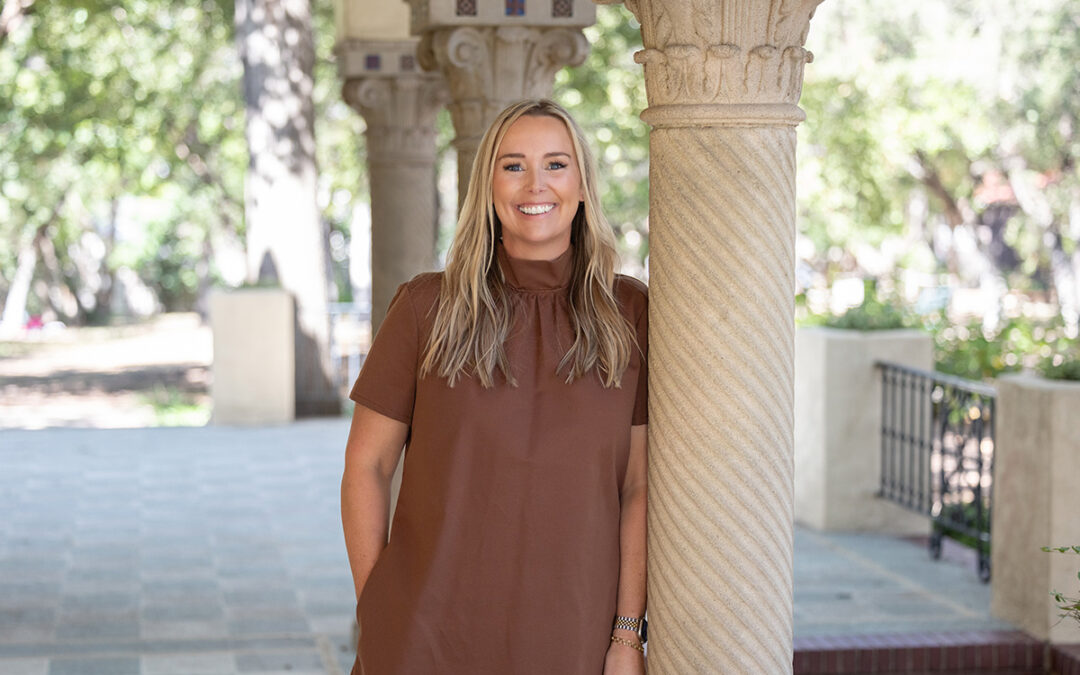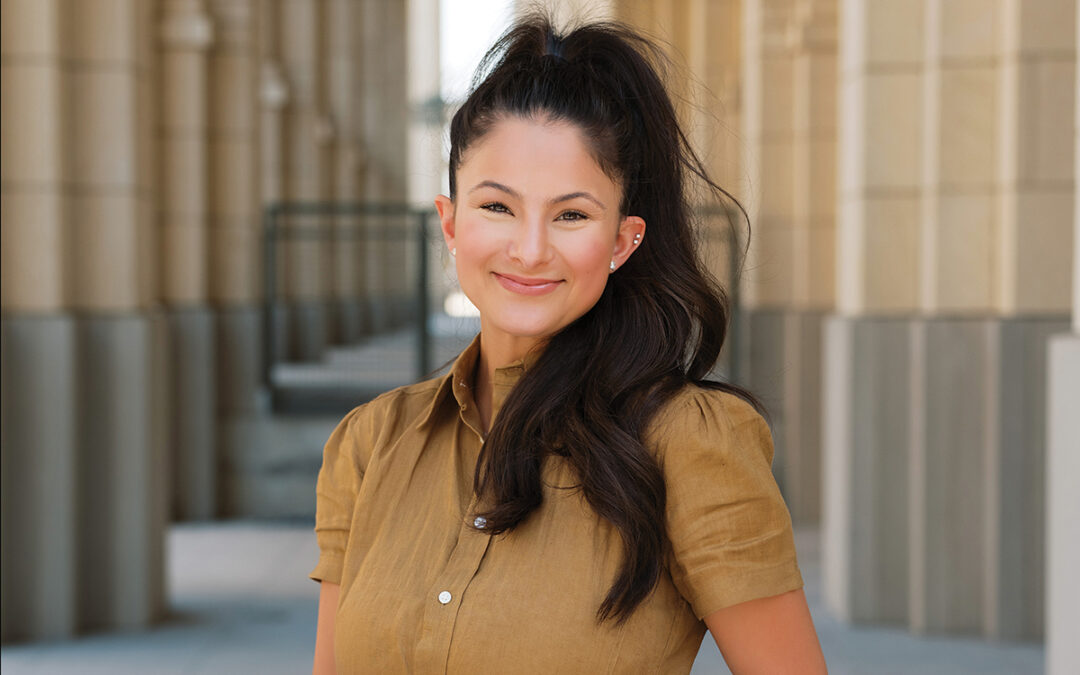For her first real post-college job, Kirsten Crow hasn’t chosen one of those hot new fields that didn’t exist in the last millennium. Instead, she’s pursuing a profession associated with Ben Franklin or, at best, the Watergate scandal of 30-plus years ago.
Crow, 24, is a general-assignment reporter at the Laredo Morning Times, where she has covered county government and crime and has written some features. It’s the traditional training route for young journalists, but does she have young readers — a necessity to sustain a career in newspaper journalism?
Among people her age, Crow admits, “Interest in reading a daily newspaper is not as strong as it once was.” Twenty-somethings tend to look online for news, she says. They’re more likely to think of a newspaper as a Web site, rather than “a physical something you can read on a train or take to lunch with you.”
During her childhood in San Antonio, this was a two-paper town, and Crow remembers both of them, though her parents subscribed to the San Antonio Express-News. “I’ve always been a big reader,” she says, “fiction or nonfiction, although I like knowing that a story is true.”
From childhood through the Communication Arts magnet school at Taft High School, Crow had been focused on creative writing, her minor at Texas State University in San Marcos, where she won awards for her short stories as well as her newspaper features.
“About halfway through college, I realized I would have to do something to make a living,” she says. “With fiction writers, it seems like if you’re an artist, you’re poor — or if you write a best-seller, you’re not an artist.”
Crow took her first journalism course while on a student exchange at a small college in northern New Jersey. She was assigned to write a feature story about a squat — an illegally occupied apartment building — on New York’s Lower East Side. The neighborhood was gritty, the apartment grim, and the tenants she had to interview were slightly scary. “I liked it,” she says with a grin.
Back at Texas State, she took more journalism classes and started reporting for the school paper, the University Star. Writing both spot news and features, Crow acquired a basic knowledge of research techniques and media law. In her junior year, she wrote the lead article for an issue that won first prize for general excellence in a state contest sponsored by the Texas College Network. As a senior, she was the Star’s news editor, keeping her hand in at writing while assigning and editing stories for more than 20 student reporters.
After cum laude graduation with a BFA in print journalism, Crow applied to a few Texas newspapers, with no luck. For a while after college, she did temporary secretarial work and even cleaned houses. “It was a little depressing for somebody who has a bachelor’s degree,” she says.
After several months of dead-end jobs, Crow went back to Texas State, where she had piled up nearly enough credits for a second degree, this time in English. She also returned to the University Star, where she resumed her position as news editor. Back in the newsroom between classes, she says, “I found myself thinking, “I wish I could do this all the time.'”
After completing her second bachelor’s, Crow went back to her newspaper job search. “I wasn’t opposed to working outside of Texas,” she says. “I’d love to travel and live in different places.” In- or out-of-state, it was hard to get an interview without previous professional experience, so when a former classmate called her about an opening at the Laredo paper, Crow was interested.
She sent a résumé, went for an interview and got the job. “It’s a small staff, with only six reporters,” she says. “It’s a great opportunity to get to do a little of everything.”
During an interview in the downtown San Antonio Public Library, she takes a cell-phone call from her editor, who’s asking about a car crash she saw and called in on her way out of Laredo. The accident and the resulting traffic tie-up will be news there. “It’s a city, but it has a small-town feel,” she says. “That’s a double-edged sword: There’s a strong sense of community, but you’ll also get someone who walks up to you while you’re shopping to complain about something you wrote in the paper.”
Crow’s blond hair stands out in Laredo, a majority-Hispanic border city. “I’m the guera (blonde),” she says cheerfully. She’s also struggling to learn Spanish on the job. “In Laredo, most people are either somewhat bilingual or monolingual in Spanish,” Crow says.
While she had taken Spanish in college, by the time she moved to Laredo last May, she says, “I’d had three years to forget it.” Through immersion, she has picked up a lot of functional Spanish. “I get along,” she says, shrugging. For stories on sensitive subjects where she needs to talk to people who are more comfortable in Spanish than English, Crow prefers to work with a translator, usually a relative of the person she’s interviewing. The technique allows her subjects to speak more fluently, “without worrying about whether they have the right English words for what they’re saying.” Someday, when she can fit it into the varying shifts of her work schedule, Crow plans to take an intensive Spanish course. “I’m learning the hard way,” she says, “language skills are something you can take anywhere.”
Creative writing is another pursuit she doesn’t have much time for at present, though she doesn’t lack for inspiration. “There’s a lot of interesting politics on the border,” Crow says, “and in Laredo, we have a lot of colorful personalities.” Last fall, she took an indepth look at youth crime in Webb County through which she met young gang members and the school personnel who try to help them. “It was an eye-opener,” she says. “Gangs are in high schools, middle schools and even elementary schools. We have (the problem) here in San Antonio, too, but it’s possible to live in a city and not see it.”
For a feature to accompany a news story about a rise in youth crime, Crow talked to a 25-year-old woman who first joined a gang at age 11, got involved with drugs and eventually started her own gang. By 16, “Mary” was a mother, married to an abusive husband, a fellow gang member. After the relationship broke up, the young woman found herself homeless. When her sister in San Antonio took her in and gave her a job, the former gang member gained confidence to be able to go home to Laredo and stay straight. With the help of a gang-intervention facilitator from her old high school, “Mary” managed to earn a GED.
Crow has heard many disturbing stories as a reporter. “For a creative writer especially,” she says, “it’s hard to stay emotionally detached. I’ve had to remind myself, “It’s not your story, but it might help someone to tell it.’ Reporters need to do their soul-searching at home, not in print.”
In recent years, scandals about journalists who fabricated or plagiarized stories “have left a black mark on the profession,” she says. “It’s going to take a long time to regain that trust.” But there’s a good side to the bad publicity, she says: “I think people are a lot more careful about their sources, about what we put in print. With the Internet, if you make a mistake, it’s out there forever.”
Whether newspapers stay on paper or move entirely to cyberspace, Crow says, “Fifty years down the road, there will still be newspapers.” After the events of Sept. 11, 2001, she points out, “There was a lot of national coverage, but it was local newspapers that brought (the events) home to people, with stories about the way the tragedies affected local people.”
Crow hopes to stay at the Laredo Morning Times for at least three years. “With a small staff, people move around, and (positions) open up,” she says. “I like writing, and I like editing. I hope I’ll be able to do both.”
She also hopes to write books, maybe even one based on her experiences in the border city. “People say it’s good material,” she says, smiling.
Meanwhile, Crow says, there are so many newspaper Web sites and so little free time to peruse them: “I’m frustrated that I can’t read every paper.”
Author: Paula Allen
Photographer: Janet Rogers









0 Comments